| Aspect | Description |
|---|---|
| Parasha Number | The 2nd Parasha in the Book of Leviticus (Vayikra). |
| Parasha Name | Tzav (צַו), translating to “Command” in Hebrew, referencing God’s instructions to Moses regarding sacrifices. |
| Torah Book | Leviticus (Vayikra). |
| Number of Verses | Comprises 95 verses. |
| Number of Words | Approximately 2,470 words in the Hebrew text. |
| Primary Characters | Key figures include Moses, Aaron, and various priests, with God communicating instructions regarding sacrifices and rituals. |
| Key Themes | Focuses on the continuation of laws regarding sacrifices, rituals, and purity, emphasizing obedience to divine commandments and the sanctity of worship. |
| Significant Events | Elaborates on the procedures for offering sacrifices, including the ordination of priests, the consecration of the Tabernacle, and the observance of ritual purity. |
| Notable Quotes | “Command Aaron and his sons, saying, ‘This is the law of the burnt offering…'” |
| Legacy | Parashat Tzav contributes to the foundational understanding of Jewish rituals and ethical conduct, emphasizing the importance of obedience to divine commandments and the sanctity of worship. |
| Relevance Today | The themes of sacrifice, obedience, and sanctity remain relevant in contemporary Jewish practice, emphasizing the significance of devotion, adherence to tradition, and spiritual purity. |
| Well-Known Stories | Include instructions for various types of offerings, the consecration of priests, and regulations concerning ritual purity. |
| Special Observances | Considered integral to synagogue services, Parashat Tzav prompts reflection on the significance of ritual sacrifice, obedience to divine commandments, and leading a morally upright life. |
| Connections to Other Texts | Tzav builds upon the preceding narratives in Exodus, particularly the construction of the Tabernacle, and sets the stage for the Israelites’ journey through the wilderness. |
| Theological Significance | Highlights the concept of atonement, the relationship between God and humanity, and the importance of obedience to divine commandments for maintaining spiritual purity and holiness. |
Parashat Vayikra, the 24th portion in the Book of Leviticus, marks the beginning of a new book in the Torah, focusing primarily on laws and rituals pertaining to sacrifice, worship, and purity. The parasha opens with God calling out to Moses from the Tent of Meeting, instructing him on the various types of offerings that the Israelites are to bring before Him. These offerings include burnt offerings, meal offerings, peace offerings, sin offerings, and guilt offerings, each serving different purposes in the religious life of the community.
Central to the themes of Vayikra is the concept of holiness and sanctification. The detailed instructions for the sacrificial system emphasize the importance of approaching God with reverence and purity, highlighting the need for ethical conduct and spiritual devotion among the Israelites. Additionally, the parasha outlines regulations regarding clean and unclean animals, further reinforcing the idea of maintaining purity in all aspects of life.
Throughout Vayikra, Moses conveys God’s commandments to the people, instructing them on how to perform the various rituals and offerings in accordance with divine law. The parasha also addresses the consecration of the priests, setting them apart for their sacred duties within the Tabernacle.
As the first portion in the book of Leviticus, Vayikra lays the groundwork for Jewish worship and ethical conduct, emphasizing the importance of obedience to divine commandments and the pursuit of holiness. Its teachings remain relevant in contemporary Jewish practice, serving as a guide for spiritual devotion, repentance, and moral living.
צו
ו׳:א׳-ח׳:ל״ו
וְלָבַ֨שׁ הַכֹּהֵ֜ן מִדּ֣וֹ בַ֗ד וּמִֽכְנְסֵי־בַד֮ יִלְבַּ֣שׁ עַל־בְּשָׂרוֹ֒ וְהֵרִ֣ים אֶת־הַדֶּ֗שֶׁן אֲשֶׁ֨ר תֹּאכַ֥ל הָאֵ֛שׁ אֶת־הָעֹלָ֖ה עַל־הַמִּזְבֵּ֑חַ וְשָׂמ֕וֹ אֵ֖צֶל הַמִּזְבֵּֽחַ׃ [לוי]
וּפָשַׁט֙ אֶת־בְּגָדָ֔יו וְלָבַ֖שׁ בְּגָדִ֣ים אֲחֵרִ֑ים וְהוֹצִ֤יא אֶת־הַדֶּ֙שֶׁן֙ אֶל־מִח֣וּץ לַֽמַּחֲנֶ֔ה אֶל־מָק֖וֹם טָהֽוֹר׃
וְהָאֵ֨שׁ עַל־הַמִּזְבֵּ֤חַ תּֽוּקַד־בּוֹ֙ לֹ֣א תִכְבֶּ֔ה וּבִעֵ֨ר עָלֶ֧יהָ הַכֹּהֵ֛ן עֵצִ֖ים בַּבֹּ֣קֶר בַּבֹּ֑קֶר וְעָרַ֤ךְ עָלֶ֙יהָ֙ הָֽעֹלָ֔ה וְהִקְטִ֥יר עָלֶ֖יהָ חֶלְבֵ֥י הַשְּׁלָמִֽים׃
אֵ֗שׁ תָּמִ֛יד תּוּקַ֥ד עַל־הַמִּזְבֵּ֖חַ לֹ֥א תִכְבֶּֽה׃ {ס} [ישראל]
וְזֹ֥את תּוֹרַ֖ת הַמִּנְחָ֑ה הַקְרֵ֨ב אֹתָ֤הּ בְּנֵֽי־אַהֲרֹן֙ לִפְנֵ֣י יְהֹוָ֔ה אֶל־פְּנֵ֖י הַמִּזְבֵּֽחַ׃
וְהֵרִ֨ים מִמֶּ֜נּוּ בְּקֻמְצ֗וֹ מִסֹּ֤לֶת הַמִּנְחָה֙ וּמִשַּׁמְנָ֔הּ וְאֵת֙ כׇּל־הַלְּבֹנָ֔ה אֲשֶׁ֖ר עַל־הַמִּנְחָ֑ה וְהִקְטִ֣יר הַמִּזְבֵּ֗חַ רֵ֧יחַ נִיחֹ֛חַ אַזְכָּרָתָ֖הּ לַיהֹוָֽה׃
וְהַנּוֹתֶ֣רֶת מִמֶּ֔נָּה יֹאכְל֖וּ אַהֲרֹ֣ן וּבָנָ֑יו מַצּ֤וֹת תֵּֽאָכֵל֙ בְּמָק֣וֹם קָדֹ֔שׁ בַּחֲצַ֥ר אֹֽהֶל־מוֹעֵ֖ד יֹאכְלֽוּהָ׃
לֹ֤א תֵאָפֶה֙ חָמֵ֔ץ חֶלְקָ֛ם נָתַ֥תִּי אֹתָ֖הּ מֵאִשָּׁ֑י קֹ֤דֶשׁ קׇֽדָשִׁים֙ הִ֔וא כַּחַטָּ֖את וְכָאָשָֽׁם׃
כׇּל־זָכָ֞ר בִּבְנֵ֤י אַהֲרֹן֙ יֹֽאכְלֶ֔נָּה חׇק־עוֹלָם֙ לְדֹרֹ֣תֵיכֶ֔ם מֵאִשֵּׁ֖י יְהֹוָ֑ה כֹּ֛ל אֲשֶׁר־יִגַּ֥ע בָּהֶ֖ם יִקְדָּֽשׁ׃ {פ} [|]
שני
וַיְדַבֵּ֥ר יְהֹוָ֖ה אֶל־מֹשֶׁ֥ה לֵּאמֹֽר׃
זֶ֡ה קׇרְבַּן֩ אַהֲרֹ֨ן וּבָנָ֜יו אֲשֶׁר־יַקְרִ֣יבוּ לַֽיהֹוָ֗ה בְּיוֹם֙ הִמָּשַׁ֣ח אֹת֔וֹ עֲשִׂירִ֨ת הָאֵפָ֥ה סֹ֛לֶת מִנְחָ֖ה תָּמִ֑יד מַחֲצִיתָ֣הּ בַּבֹּ֔קֶר וּמַחֲצִיתָ֖הּ בָּעָֽרֶב׃
עַֽל־מַחֲבַ֗ת בַּשֶּׁ֛מֶן תֵּעָשֶׂ֖ה מֻרְבֶּ֣כֶת תְּבִיאֶ֑נָּה תֻּפִינֵי֙ מִנְחַ֣ת פִּתִּ֔ים תַּקְרִ֥יב רֵֽיחַ־נִיחֹ֖חַ לַיהֹוָֽה׃
וְהַכֹּהֵ֨ן הַמָּשִׁ֧יחַ תַּחְתָּ֛יו מִבָּנָ֖יו יַעֲשֶׂ֣ה אֹתָ֑הּ חׇק־עוֹלָ֕ם לַיהֹוָ֖ה כָּלִ֥יל תׇּקְטָֽר׃
וְכׇל־מִנְחַ֥ת כֹּהֵ֛ן כָּלִ֥יל תִּהְיֶ֖ה לֹ֥א תֵאָכֵֽל׃ {פ}
וַיְדַבֵּ֥ר יְהֹוָ֖ה אֶל־מֹשֶׁ֥ה לֵּאמֹֽר׃
דַּבֵּ֤ר אֶֽל־אַהֲרֹן֙ וְאֶל־בָּנָ֣יו לֵאמֹ֔ר זֹ֥את תּוֹרַ֖ת הַֽחַטָּ֑את בִּמְק֡וֹם אֲשֶׁר֩ תִּשָּׁחֵ֨ט הָעֹלָ֜ה תִּשָּׁחֵ֤ט הַֽחַטָּאת֙ לִפְנֵ֣י יְהֹוָ֔ה קֹ֥דֶשׁ קׇֽדָשִׁ֖ים הִֽוא׃
הַכֹּהֵ֛ן הַֽמְחַטֵּ֥א אֹתָ֖הּ יֹאכְלֶ֑נָּה בְּמָק֤וֹם קָדֹשׁ֙ תֵּֽאָכֵ֔ל בַּחֲצַ֖ר אֹ֥הֶל מוֹעֵֽד׃
כֹּ֛ל אֲשֶׁר־יִגַּ֥ע בִּבְשָׂרָ֖הּ יִקְדָּ֑שׁ וַאֲשֶׁ֨ר יִזֶּ֤ה מִדָּמָהּ֙ עַל־הַבֶּ֔גֶד אֲשֶׁר֙ יִזֶּ֣ה עָלֶ֔יהָ תְּכַבֵּ֖ס בְּמָק֥וֹם קָדֹֽשׁ׃
וּכְלִי־חֶ֛רֶשׂ אֲשֶׁ֥ר תְּבֻשַּׁל־בּ֖וֹ יִשָּׁבֵ֑ר וְאִם־בִּכְלִ֤י נְחֹ֙שֶׁת֙ בֻּשָּׁ֔לָה וּמֹרַ֥ק וְשֻׁטַּ֖ף בַּמָּֽיִם׃
כׇּל־זָכָ֥ר בַּכֹּהֲנִ֖ים יֹאכַ֣ל אֹתָ֑הּ קֹ֥דֶשׁ קׇֽדָשִׁ֖ים הִֽוא׃
וְכׇל־חַטָּ֡את אֲשֶׁר֩ יוּבָ֨א מִדָּמָ֜הּ אֶל־אֹ֧הֶל מוֹעֵ֛ד לְכַפֵּ֥ר בַּקֹּ֖דֶשׁ לֹ֣א תֵאָכֵ֑ל בָּאֵ֖שׁ תִּשָּׂרֵֽף׃ {פ}
ז׳
וְזֹ֥את תּוֹרַ֖ת הָאָשָׁ֑ם קֹ֥דֶשׁ קׇֽדָשִׁ֖ים הֽוּא׃
בִּמְק֗וֹם אֲשֶׁ֤ר יִשְׁחֲטוּ֙ אֶת־הָ֣עֹלָ֔ה יִשְׁחֲט֖וּ אֶת־הָאָשָׁ֑ם וְאֶת־דָּמ֛וֹ יִזְרֹ֥ק עַל־הַמִּזְבֵּ֖חַ סָבִֽיב׃
וְאֵ֥ת כׇּל־חֶלְבּ֖וֹ יַקְרִ֣יב מִמֶּ֑נּוּ אֵ֚ת הָֽאַלְיָ֔ה וְאֶת־הַחֵ֖לֶב הַֽמְכַסֶּ֥ה אֶת־הַקֶּֽרֶב׃
וְאֵת֙ שְׁתֵּ֣י הַכְּלָיֹ֔ת וְאֶת־הַחֵ֙לֶב֙ אֲשֶׁ֣ר עֲלֵיהֶ֔ן אֲשֶׁ֖ר עַל־הַכְּסָלִ֑ים וְאֶת־הַיֹּתֶ֙רֶת֙ עַל־הַכָּבֵ֔ד עַל־הַכְּלָיֹ֖ת יְסִירֶֽנָּה׃
וְהִקְטִ֨יר אֹתָ֤ם הַכֹּהֵן֙ הַמִּזְבֵּ֔חָה אִשֶּׁ֖ה לַיהֹוָ֑ה אָשָׁ֖ם הֽוּא׃
כׇּל־זָכָ֥ר בַּכֹּהֲנִ֖ים יֹאכְלֶ֑נּוּ בְּמָק֤וֹם קָדוֹשׁ֙ יֵאָכֵ֔ל קֹ֥דֶשׁ קׇֽדָשִׁ֖ים הֽוּא׃
כַּֽחַטָּאת֙ כָּֽאָשָׁ֔ם תּוֹרָ֥ה אַחַ֖ת לָהֶ֑ם הַכֹּהֵ֛ן אֲשֶׁ֥ר יְכַפֶּר־בּ֖וֹ ל֥וֹ יִהְיֶֽה׃
וְהַ֨כֹּהֵ֔ן הַמַּקְרִ֖יב אֶת־עֹ֣לַת אִ֑ישׁ ע֤וֹר הָֽעֹלָה֙ אֲשֶׁ֣ר הִקְרִ֔יב לַכֹּהֵ֖ן ל֥וֹ יִהְיֶֽה׃
וְכׇל־מִנְחָ֗ה אֲשֶׁ֤ר תֵּֽאָפֶה֙ בַּתַּנּ֔וּר וְכׇל־נַעֲשָׂ֥ה בַמַּרְחֶ֖שֶׁת וְעַֽל־מַחֲבַ֑ת לַכֹּהֵ֛ן הַמַּקְרִ֥יב אֹתָ֖הּ ל֥וֹ תִֽהְיֶֽה׃
וְכׇל־מִנְחָ֥ה בְלוּלָֽה־בַשֶּׁ֖מֶן וַחֲרֵבָ֑ה לְכׇל־בְּנֵ֧י אַהֲרֹ֛ן תִּהְיֶ֖ה אִ֥ישׁ כְּאָחִֽיו׃ {פ}
שלישי
וְזֹ֥את תּוֹרַ֖ת זֶ֣בַח הַשְּׁלָמִ֑ים אֲשֶׁ֥ר יַקְרִ֖יב לַיהֹוָֽה׃
אִ֣ם עַל־תּוֹדָה֮ יַקְרִיבֶ֒נּוּ֒ וְהִקְרִ֣יב ׀ עַל־זֶ֣בַח הַתּוֹדָ֗ה חַלּ֤וֹת מַצּוֹת֙ בְּלוּלֹ֣ת בַּשֶּׁ֔מֶן וּרְקִיקֵ֥י מַצּ֖וֹת מְשֻׁחִ֣ים בַּשָּׁ֑מֶן וְסֹ֣לֶת מֻרְבֶּ֔כֶת חַלֹּ֖ת בְּלוּלֹ֥ת בַּשָּֽׁמֶן׃
עַל־חַלֹּת֙ לֶ֣חֶם חָמֵ֔ץ יַקְרִ֖יב קׇרְבָּנ֑וֹ עַל־זֶ֖בַח תּוֹדַ֥ת שְׁלָמָֽיו׃
וְהִקְרִ֨יב מִמֶּ֤נּוּ אֶחָד֙ מִכׇּל־קׇרְבָּ֔ן תְּרוּמָ֖ה לַיהֹוָ֑ה לַכֹּהֵ֗ן הַזֹּרֵ֛ק אֶת־דַּ֥ם הַשְּׁלָמִ֖ים ל֥וֹ יִהְיֶֽה׃
וּבְשַׂ֗ר זֶ֚בַח תּוֹדַ֣ת שְׁלָמָ֔יו בְּי֥וֹם קׇרְבָּנ֖וֹ יֵאָכֵ֑ל לֹֽא־יַנִּ֥יחַ מִמֶּ֖נּוּ עַד־בֹּֽקֶר׃
וְאִם־נֶ֣דֶר ׀ א֣וֹ נְדָבָ֗ה זֶ֚בַח קׇרְבָּנ֔וֹ בְּי֛וֹם הַקְרִיב֥וֹ אֶת־זִבְח֖וֹ יֵאָכֵ֑ל וּמִֽמׇּחֳרָ֔ת וְהַנּוֹתָ֥ר מִמֶּ֖נּוּ יֵאָכֵֽל׃
וְהַנּוֹתָ֖ר מִבְּשַׂ֣ר הַזָּ֑בַח בַּיּוֹם֙ הַשְּׁלִישִׁ֔י בָּאֵ֖שׁ יִשָּׂרֵֽף׃
וְאִ֣ם הֵאָכֹ֣ל יֵ֠אָכֵ֠ל מִבְּשַׂר־זֶ֨בַח שְׁלָמָ֜יו בַּיּ֣וֹם הַשְּׁלִישִׁי֮ לֹ֣א יֵרָצֶה֒ הַמַּקְרִ֣יב אֹת֗וֹ לֹ֧א יֵחָשֵׁ֛ב ל֖וֹ פִּגּ֣וּל יִהְיֶ֑ה וְהַנֶּ֛פֶשׁ הָאֹכֶ֥לֶת מִמֶּ֖נּוּ עֲוֺנָ֥הּ תִּשָּֽׂא׃
וְהַבָּשָׂ֞ר אֲשֶׁר־יִגַּ֤ע בְּכׇל־טָמֵא֙ לֹ֣א יֵֽאָכֵ֔ל בָּאֵ֖שׁ יִשָּׂרֵ֑ף וְהַ֨בָּשָׂ֔ר כׇּל־טָה֖וֹר יֹאכַ֥ל בָּשָֽׂר׃
וְהַנֶּ֜פֶשׁ אֲשֶׁר־תֹּאכַ֣ל בָּשָׂ֗ר מִזֶּ֤בַח הַשְּׁלָמִים֙ אֲשֶׁ֣ר לַיהֹוָ֔ה וְטֻמְאָת֖וֹ עָלָ֑יו וְנִכְרְתָ֛ה הַנֶּ֥פֶשׁ הַהִ֖וא מֵעַמֶּֽיהָ׃
וְנֶ֜פֶשׁ כִּֽי־תִגַּ֣ע בְּכׇל־טָמֵ֗א בְּטֻמְאַ֤ת אָדָם֙ א֣וֹ ׀ בִּבְהֵמָ֣ה טְמֵאָ֗ה א֚וֹ בְּכׇל־שֶׁ֣קֶץ טָמֵ֔א וְאָכַ֛ל מִבְּשַׂר־זֶ֥בַח הַשְּׁלָמִ֖ים אֲשֶׁ֣ר לַיהֹוָ֑ה וְנִכְרְתָ֛ה הַנֶּ֥פֶשׁ הַהִ֖וא מֵעַמֶּֽיהָ׃ {פ}
וַיְדַבֵּ֥ר יְהֹוָ֖ה אֶל־מֹשֶׁ֥ה לֵּאמֹֽר׃
דַּבֵּ֛ר אֶל־בְּנֵ֥י יִשְׂרָאֵ֖ל לֵאמֹ֑ר כׇּל־חֵ֜לֶב שׁ֥וֹר וְכֶ֛שֶׂב וָעֵ֖ז לֹ֥א תֹאכֵֽלוּ׃
וְחֵ֤לֶב נְבֵלָה֙ וְחֵ֣לֶב טְרֵפָ֔ה יֵעָשֶׂ֖ה לְכׇל־מְלָאכָ֑ה וְאָכֹ֖ל לֹ֥א תֹאכְלֻֽהוּ׃
כִּ֚י כׇּל־אֹכֵ֣ל חֵ֔לֶב מִ֨ן־הַבְּהֵמָ֔ה אֲשֶׁ֨ר יַקְרִ֥יב מִמֶּ֛נָּה אִשֶּׁ֖ה לַיהֹוָ֑ה וְנִכְרְתָ֛ה הַנֶּ֥פֶשׁ הָאֹכֶ֖לֶת מֵֽעַמֶּֽיהָ׃
וְכׇל־דָּם֙ לֹ֣א תֹאכְל֔וּ בְּכֹ֖ל מוֹשְׁבֹתֵיכֶ֑ם לָע֖וֹף וְלַבְּהֵמָֽה׃
כׇּל־נֶ֖פֶשׁ אֲשֶׁר־תֹּאכַ֣ל כׇּל־דָּ֑ם וְנִכְרְתָ֛ה הַנֶּ֥פֶשׁ הַהִ֖וא מֵֽעַמֶּֽיהָ׃ {פ}
וַיְדַבֵּ֥ר יְהֹוָ֖ה אֶל־מֹשֶׁ֥ה לֵּאמֹֽר׃
דַּבֵּ֛ר אֶל־בְּנֵ֥י יִשְׂרָאֵ֖ל לֵאמֹ֑ר הַמַּקְרִ֞יב אֶת־זֶ֤בַח שְׁלָמָיו֙ לַיהֹוָ֔ה יָבִ֧יא אֶת־קׇרְבָּנ֛וֹ לַיהֹוָ֖ה מִזֶּ֥בַח שְׁלָמָֽיו׃
יָדָ֣יו תְּבִיאֶ֔ינָה אֵ֖ת אִשֵּׁ֣י יְהֹוָ֑ה אֶת־הַחֵ֤לֶב עַל־הֶֽחָזֶה֙ יְבִיאֶ֔נּוּ אֵ֣ת הֶחָזֶ֗ה לְהָנִ֥יף אֹת֛וֹ תְּנוּפָ֖ה לִפְנֵ֥י יְהֹוָֽה׃
וְהִקְטִ֧יר הַכֹּהֵ֛ן אֶת־הַחֵ֖לֶב הַמִּזְבֵּ֑חָה וְהָיָה֙ הֶֽחָזֶ֔ה לְאַהֲרֹ֖ן וּלְבָנָֽיו׃
וְאֵת֙ שׁ֣וֹק הַיָּמִ֔ין תִּתְּנ֥וּ תְרוּמָ֖ה לַכֹּהֵ֑ן מִזִּבְחֵ֖י שַׁלְמֵיכֶֽם׃
הַמַּקְרִ֞יב אֶת־דַּ֧ם הַשְּׁלָמִ֛ים וְאֶת־הַחֵ֖לֶב מִבְּנֵ֣י אַהֲרֹ֑ן ל֧וֹ תִהְיֶ֛ה שׁ֥וֹק הַיָּמִ֖ין לְמָנָֽה׃
כִּי֩ אֶת־חֲזֵ֨ה הַתְּנוּפָ֜ה וְאֵ֣ת ׀ שׁ֣וֹק הַתְּרוּמָ֗ה לָקַ֙חְתִּי֙ מֵאֵ֣ת בְּנֵֽי־יִשְׂרָאֵ֔ל מִזִּבְחֵ֖י שַׁלְמֵיהֶ֑ם וָאֶתֵּ֣ן אֹ֠תָ֠ם לְאַהֲרֹ֨ן הַכֹּהֵ֤ן וּלְבָנָיו֙ לְחׇק־עוֹלָ֔ם מֵאֵ֖ת בְּנֵ֥י יִשְׂרָאֵֽל׃
זֹ֣את מִשְׁחַ֤ת אַהֲרֹן֙ וּמִשְׁחַ֣ת בָּנָ֔יו מֵאִשֵּׁ֖י יְהֹוָ֑ה בְּיוֹם֙ הִקְרִ֣יב אֹתָ֔ם לְכַהֵ֖ן לַיהֹוָֽה׃
אֲשֶׁר֩ צִוָּ֨ה יְהֹוָ֜ה לָתֵ֣ת לָהֶ֗ם בְּיוֹם֙ מׇשְׁח֣וֹ אֹתָ֔ם מֵאֵ֖ת בְּנֵ֣י יִשְׂרָאֵ֑ל חֻקַּ֥ת עוֹלָ֖ם לְדֹרֹתָֽם׃
זֹ֣את הַתּוֹרָ֗ה לָֽעֹלָה֙ לַמִּנְחָ֔ה וְלַֽחַטָּ֖את וְלָאָשָׁ֑ם וְלַ֨מִּלּוּאִ֔ים וּלְזֶ֖בַח הַשְּׁלָמִֽים׃
אֲשֶׁ֨ר צִוָּ֧ה יְהֹוָ֛ה אֶת־מֹשֶׁ֖ה בְּהַ֣ר סִינָ֑י בְּי֨וֹם צַוֺּת֜וֹ אֶת־בְּנֵ֣י יִשְׂרָאֵ֗ל לְהַקְרִ֧יב אֶת־קׇרְבְּנֵיהֶ֛ם לַיהֹוָ֖ה בְּמִדְבַּ֥ר סִינָֽי׃ {פ}
ח׳
רביעי
וַיְדַבֵּ֥ר יְהֹוָ֖ה אֶל־מֹשֶׁ֥ה לֵּאמֹֽר׃
קַ֤ח אֶֽת־אַהֲרֹן֙ וְאֶת־בָּנָ֣יו אִתּ֔וֹ וְאֵת֙ הַבְּגָדִ֔ים וְאֵ֖ת שֶׁ֣מֶן הַמִּשְׁחָ֑ה וְאֵ֣ת ׀ פַּ֣ר הַֽחַטָּ֗את וְאֵת֙ שְׁנֵ֣י הָֽאֵילִ֔ים וְאֵ֖ת סַ֥ל הַמַּצּֽוֹת׃
וְאֵ֥ת כׇּל־הָעֵדָ֖ה הַקְהֵ֑ל אֶל־פֶּ֖תַח אֹ֥הֶל מוֹעֵֽד׃
וַיַּ֣עַשׂ מֹשֶׁ֔ה כַּֽאֲשֶׁ֛ר צִוָּ֥ה יְהֹוָ֖ה אֹת֑וֹ וַתִּקָּהֵל֙ הָֽעֵדָ֔ה אֶל־פֶּ֖תַח אֹ֥הֶל מוֹעֵֽד׃
וַיֹּ֥אמֶר מֹשֶׁ֖ה אֶל־הָעֵדָ֑ה זֶ֣ה הַדָּבָ֔ר אֲשֶׁר־צִוָּ֥ה יְהֹוָ֖ה לַעֲשֽׂוֹת׃
וַיַּקְרֵ֣ב מֹשֶׁ֔ה אֶֽת־אַהֲרֹ֖ן וְאֶת־בָּנָ֑יו וַיִּרְחַ֥ץ אֹתָ֖ם בַּמָּֽיִם׃
וַיִּתֵּ֨ן עָלָ֜יו אֶת־הַכֻּתֹּ֗נֶת וַיַּחְגֹּ֤ר אֹתוֹ֙ בָּֽאַבְנֵ֔ט וַיַּלְבֵּ֤שׁ אֹתוֹ֙ אֶֽת־הַמְּעִ֔יל וַיִּתֵּ֥ן עָלָ֖יו אֶת־הָאֵפֹ֑ד וַיַּחְגֹּ֣ר אֹת֗וֹ בְּחֵ֙שֶׁב֙ הָֽאֵפֹ֔ד וַיֶּאְפֹּ֥ד ל֖וֹ בּֽוֹ׃
וַיָּ֥שֶׂם עָלָ֖יו אֶת־הַחֹ֑שֶׁן וַיִּתֵּן֙ אֶל־הַחֹ֔שֶׁן אֶת־הָאוּרִ֖ים וְאֶת־הַתֻּמִּֽים׃
וַיָּ֥שֶׂם אֶת־הַמִּצְנֶ֖פֶת עַל־רֹאשׁ֑וֹ וַיָּ֨שֶׂם עַֽל־הַמִּצְנֶ֜פֶת אֶל־מ֣וּל פָּנָ֗יו אֵ֣ת צִ֤יץ הַזָּהָב֙ נֵ֣זֶר הַקֹּ֔דֶשׁ כַּאֲשֶׁ֛ר צִוָּ֥ה יְהֹוָ֖ה אֶת־מֹשֶֽׁה׃
וַיִּקַּ֤ח מֹשֶׁה֙ אֶת־שֶׁ֣מֶן הַמִּשְׁחָ֔ה וַיִּמְשַׁ֥ח אֶת־הַמִּשְׁכָּ֖ן וְאֶת־כׇּל־אֲשֶׁר־בּ֑וֹ וַיְקַדֵּ֖שׁ אֹתָֽם׃
וַיַּ֥ז מִמֶּ֛נּוּ עַל־הַמִּזְבֵּ֖חַ שֶׁ֣בַע פְּעָמִ֑ים וַיִּמְשַׁ֨ח אֶת־הַמִּזְבֵּ֜חַ וְאֶת־כׇּל־כֵּלָ֗יו וְאֶת־הַכִּיֹּ֛ר וְאֶת־כַּנּ֖וֹ לְקַדְּשָֽׁם׃
וַיִּצֹק֙ מִשֶּׁ֣מֶן הַמִּשְׁחָ֔ה עַ֖ל רֹ֣אשׁ אַהֲרֹ֑ן וַיִּמְשַׁ֥ח אֹת֖וֹ לְקַדְּשֽׁוֹ׃
וַיַּקְרֵ֨ב מֹשֶׁ֜ה אֶת־בְּנֵ֣י אַהֲרֹ֗ן וַיַּלְבִּשֵׁ֤ם כֻּתֳּנֹת֙ וַיַּחְגֹּ֤ר אֹתָם֙ אַבְנֵ֔ט וַיַּחֲבֹ֥שׁ לָהֶ֖ם מִגְבָּע֑וֹת כַּאֲשֶׁ֛ר צִוָּ֥ה יְהֹוָ֖ה אֶת־מֹשֶֽׁה׃
חמישי
וַיַּגֵּ֕שׁ אֵ֖ת פַּ֣ר הַֽחַטָּ֑את וַיִּסְמֹ֨ךְ אַהֲרֹ֤ן וּבָנָיו֙ אֶת־יְדֵיהֶ֔ם עַל־רֹ֖אשׁ פַּ֥ר הַֽחַטָּֽאת׃
וַיִּשְׁחָ֗ט וַיִּקַּ֨ח מֹשֶׁ֤ה אֶת־הַדָּם֙ וַ֠יִּתֵּ֠ן עַל־קַרְנ֨וֹת הַמִּזְבֵּ֤חַ סָבִיב֙ בְּאֶצְבָּע֔וֹ וַיְחַטֵּ֖א אֶת־הַמִּזְבֵּ֑חַ וְאֶת־הַדָּ֗ם יָצַק֙ אֶל־יְס֣וֹד הַמִּזְבֵּ֔חַ וַֽיְקַדְּשֵׁ֖הוּ לְכַפֵּ֥ר עָלָֽיו׃
וַיִּקַּ֗ח אֶֽת־כׇּל־הַחֵ֘לֶב֮ אֲשֶׁ֣ר עַל־הַקֶּ֒רֶב֒ וְאֵת֙ יֹתֶ֣רֶת הַכָּבֵ֔ד וְאֶת־שְׁתֵּ֥י הַכְּלָיֹ֖ת וְאֶֽת־חֶלְבְּהֶ֑ן וַיַּקְטֵ֥ר מֹשֶׁ֖ה הַמִּזְבֵּֽחָה׃
וְאֶת־הַפָּ֤ר וְאֶת־עֹרוֹ֙ וְאֶת־בְּשָׂר֣וֹ וְאֶת־פִּרְשׁ֔וֹ שָׂרַ֣ף בָּאֵ֔שׁ מִח֖וּץ לַֽמַּחֲנֶ֑ה כַּאֲשֶׁ֛ר צִוָּ֥ה יְהֹוָ֖ה אֶת־מֹשֶֽׁה׃
וַיַּקְרֵ֕ב אֵ֖ת אֵ֣יל הָעֹלָ֑ה וַֽיִּסְמְכ֞וּ אַהֲרֹ֧ן וּבָנָ֛יו אֶת־יְדֵיהֶ֖ם עַל־רֹ֥אשׁ הָאָֽיִל׃
וַיִּשְׁחָ֑ט וַיִּזְרֹ֨ק מֹשֶׁ֧ה אֶת־הַדָּ֛ם עַל־הַמִּזְבֵּ֖חַ סָבִֽיב׃
וְאֶ֨ת־הָאַ֔יִל נִתַּ֖ח לִנְתָחָ֑יו וַיַּקְטֵ֤ר מֹשֶׁה֙ אֶת־הָרֹ֔אשׁ וְאֶת־הַנְּתָחִ֖ים וְאֶת־הַפָּֽדֶר׃
וְאֶת־הַקֶּ֥רֶב וְאֶת־הַכְּרָעַ֖יִם רָחַ֣ץ בַּמָּ֑יִם וַיַּקְטֵר֩ מֹשֶׁ֨ה אֶת־כׇּל־הָאַ֜יִל הַמִּזְבֵּ֗חָה עֹלָ֨ה ה֤וּא לְרֵֽיחַ־נִיחֹ֙חַ֙ אִשֶּׁ֥ה הוּא֙ לַיהֹוָ֔ה כַּאֲשֶׁ֛ר צִוָּ֥ה יְהֹוָ֖ה אֶת־מֹשֶֽׁה׃
שישי
וַיַּקְרֵב֙ אֶת־הָאַ֣יִל הַשֵּׁנִ֔י אֵ֖יל הַמִּלֻּאִ֑ים וַֽיִּסְמְכ֞וּ אַהֲרֹ֧ן וּבָנָ֛יו אֶת־יְדֵיהֶ֖ם עַל־רֹ֥אשׁ הָאָֽיִל׃
וַיִּשְׁחָ֓ט ׀ וַיִּקַּ֤ח מֹשֶׁה֙ מִדָּמ֔וֹ וַיִּתֵּ֛ן עַל־תְּנ֥וּךְ אֹֽזֶן־אַהֲרֹ֖ן הַיְמָנִ֑ית וְעַל־בֹּ֤הֶן יָדוֹ֙ הַיְמָנִ֔ית וְעַל־בֹּ֥הֶן רַגְל֖וֹ הַיְמָנִֽית׃
וַיַּקְרֵ֞ב אֶת־בְּנֵ֣י אַהֲרֹ֗ן וַיִּתֵּ֨ן מֹשֶׁ֤ה מִן־הַדָּם֙ עַל־תְּנ֤וּךְ אׇזְנָם֙ הַיְמָנִ֔ית וְעַל־בֹּ֤הֶן יָדָם֙ הַיְמָנִ֔ית וְעַל־בֹּ֥הֶן רַגְלָ֖ם הַיְמָנִ֑ית וַיִּזְרֹ֨ק מֹשֶׁ֧ה אֶת־הַדָּ֛ם עַל־הַֽמִּזְבֵּ֖חַ סָבִֽיב׃
וַיִּקַּ֞ח אֶת־הַחֵ֣לֶב וְאֶת־הָֽאַלְיָ֗ה וְאֶֽת־כׇּל־הַחֵ֘לֶב֮ אֲשֶׁ֣ר עַל־הַקֶּ֒רֶב֒ וְאֵת֙ יֹתֶ֣רֶת הַכָּבֵ֔ד וְאֶת־שְׁתֵּ֥י הַכְּלָיֹ֖ת וְאֶֽת־חֶלְבְּהֶ֑ן וְאֵ֖ת שׁ֥וֹק הַיָּמִֽין׃
וּמִסַּ֨ל הַמַּצּ֜וֹת אֲשֶׁ֣ר ׀ לִפְנֵ֣י יְהֹוָ֗ה לָ֠קַ֠ח חַלַּ֨ת מַצָּ֤ה אַחַת֙ וְֽחַלַּ֨ת לֶ֥חֶם שֶׁ֛מֶן אַחַ֖ת וְרָקִ֣יק אֶחָ֑ד וַיָּ֙שֶׂם֙ עַל־הַ֣חֲלָבִ֔ים וְעַ֖ל שׁ֥וֹק הַיָּמִֽין׃
וַיִּתֵּ֣ן אֶת־הַכֹּ֔ל עַ֚ל כַּפֵּ֣י אַהֲרֹ֔ן וְעַ֖ל כַּפֵּ֣י בָנָ֑יו וַיָּ֧נֶף אֹתָ֛ם תְּנוּפָ֖ה לִפְנֵ֥י יְהֹוָֽה׃
וַיִּקַּ֨ח מֹשֶׁ֤ה אֹתָם֙ מֵעַ֣ל כַּפֵּיהֶ֔ם וַיַּקְטֵ֥ר הַמִּזְבֵּ֖חָה עַל־הָעֹלָ֑ה מִלֻּאִ֥ים הֵם֙ לְרֵ֣יחַ נִיחֹ֔חַ אִשֶּׁ֥ה ה֖וּא לַיהֹוָֽה׃
וַיִּקַּ֤ח מֹשֶׁה֙ אֶת־הֶ֣חָזֶ֔ה וַיְנִיפֵ֥הוּ תְנוּפָ֖ה לִפְנֵ֣י יְהֹוָ֑ה מֵאֵ֣יל הַמִּלֻּאִ֗ים לְמֹשֶׁ֤ה הָיָה֙ לְמָנָ֔ה כַּאֲשֶׁ֛ר צִוָּ֥ה יְהֹוָ֖ה אֶת־מֹשֶֽׁה׃
שביעי
וַיִּקַּ֨ח מֹשֶׁ֜ה מִשֶּׁ֣מֶן הַמִּשְׁחָ֗ה וּמִן־הַדָּם֮ אֲשֶׁ֣ר עַל־הַמִּזְבֵּ֒חַ֒ וַיַּ֤ז עַֽל־אַהֲרֹן֙ עַל־בְּגָדָ֔יו וְעַל־בָּנָ֛יו וְעַל־בִּגְדֵ֥י בָנָ֖יו אִתּ֑וֹ וַיְקַדֵּ֤שׁ אֶֽת־אַהֲרֹן֙ אֶת־בְּגָדָ֔יו וְאֶת־בָּנָ֛יו וְאֶת־בִּגְדֵ֥י בָנָ֖יו אִתּֽוֹ׃
וַיֹּ֨אמֶר מֹשֶׁ֜ה אֶל־אַהֲרֹ֣ן וְאֶל־בָּנָ֗יו בַּשְּׁל֣וּ אֶת־הַבָּשָׂר֮ פֶּ֣תַח אֹ֣הֶל מוֹעֵד֒ וְשָׁם֙ תֹּאכְל֣וּ אֹת֔וֹ וְאֶ֨ת־הַלֶּ֔חֶם אֲשֶׁ֖ר בְּסַ֣ל הַמִּלֻּאִ֑ים כַּאֲשֶׁ֤ר צִוֵּ֙יתִי֙ לֵאמֹ֔ר אַהֲרֹ֥ן וּבָנָ֖יו יֹאכְלֻֽהוּ׃
וְהַנּוֹתָ֥ר בַּבָּשָׂ֖ר וּבַלָּ֑חֶם בָּאֵ֖שׁ תִּשְׂרֹֽפוּ׃
וּמִפֶּ֩תַח֩ אֹ֨הֶל מוֹעֵ֜ד לֹ֤א תֵֽצְאוּ֙ שִׁבְעַ֣ת יָמִ֔ים עַ֚ד י֣וֹם מְלֹ֔את יְמֵ֖י מִלֻּאֵיכֶ֑ם כִּ֚י שִׁבְעַ֣ת יָמִ֔ים יְמַלֵּ֖א אֶת־יֶדְכֶֽם׃
כַּאֲשֶׁ֥ר עָשָׂ֖ה בַּיּ֣וֹם הַזֶּ֑ה צִוָּ֧ה יְהֹוָ֛ה לַעֲשֹׂ֖ת לְכַפֵּ֥ר עֲלֵיכֶֽם׃
וּפֶ֩תַח֩ אֹ֨הֶל מוֹעֵ֜ד תֵּשְׁב֨וּ יוֹמָ֤ם וָלַ֙יְלָה֙ שִׁבְעַ֣ת יָמִ֔ים וּשְׁמַרְתֶּ֛ם אֶת־מִשְׁמֶ֥רֶת יְהֹוָ֖ה וְלֹ֣א תָמ֑וּתוּ כִּי־כֵ֖ן צֻוֵּֽיתִי׃
וַיַּ֥עַשׂ אַהֲרֹ֖ן וּבָנָ֑יו אֵ֚ת כׇּל־הַדְּבָרִ֔ים אֲשֶׁר־צִוָּ֥ה יְהֹוָ֖ה בְּיַד־מֹשֶֽׁה׃ {ס}
Tzav
Leviticus 6:1-8:36
Command Aaron and his sons thus: This is the ritual of the burnt offering: The burnt offering itself shall remain where it is burned upon the altar all night until morning, while the fire on the altar is kept going on it.
The priest shall dress in linen raiment, with linen breeches next to his body; and he shall take up the ashes to which the fire has reduced the burnt offering on the altar and place them beside the altar.
He shall then take off his vestments and put on other vestments, and carry the ashes outside the camp to a pure place.
The fire on the altar shall be kept burning, not to go out: every morning the priest shall feed wood to it, lay out the burnt offering on it, and turn into smoke the fat parts of the offerings of well-being.
A perpetual fire shall be kept burning on the altar, not to go out.
And this is the ritual of the meal offering: Aaron’s sons shall present it before יהוה, in front of the altar.
A handful of the choice flour and oil of the meal offering shall be taken from it, with all the frankincense that is on the meal offering, and this token portion shall be turned into smoke on the altar as a pleasing odor to יהוה.
What is left of it shall be eaten by Aaron and his sons; it shall be eaten as unleavened cakes, in the sacred precinct; they shall eat it in the enclosure of the Tent of Meeting.
It shall not be baked with leaven; I have given it as their portion from My offerings by fire; it is most holy, like the sin offering and the guilt offering.
Only the males among Aaron’s descendants may eat of it, as their due for all time throughout the ages from יהוה’s offerings by fire. Anything that touches these shall become holy.
Second
יהוה spoke to Moses, saying:
This is the offering that Aaron and his sons shall offer to יהוה on the occasion of his anointment: a tenth of an ephah of choice flour as a regular meal offering, half of it in the morning and half of it in the evening,
shall be prepared with oil on a griddle. You shall bring it well soaked, and offer it as a meal offering of baked slices, of pleasing odor to יהוה.
And so shall the priest, anointed from among his sons to succeed him, prepare it; it is יהוה’s—a law for all time—to be turned entirely into smoke.
So, too, every meal offering of a priest shall be a whole offering: it shall not be eaten.
יהוה spoke to Moses, saying:
Speak to Aaron and his sons thus: This is the ritual of the sin offering: the sin offering shall be slaughtered before יהוה, at the spot where the burnt offering is slaughtered: it is most holy.
The priest who offers it as a sin offering shall eat of it; it shall be eaten in the sacred precinct, in the enclosure of the Tent of Meeting.
Anything that touches its flesh shall become holy; and if any of its blood is spattered upon a garment, you shall wash the bespattered part in the sacred precinct.
An earthen vessel in which it was boiled shall be broken; if it was boiled in a copper vessel, [the vessel] shall be scoured and rinsed with water.
Only the males in the priestly line may eat of it: it is most holy.
But no sin offering may be eaten from which any blood is brought into the Tent of Meeting for expiation in the sanctuary; any such shall be consumed in fire.
7
This is the ritual of the guilt offering: it is most holy.
The guilt offering shall be slaughtered at the spot where the burnt offering is slaughtered, and the blood shall be dashed on all sides of the altar.
All its fat shall be offered: the broad tail; the fat that covers the entrails;
the two kidneys and the fat that is on them at the loins; and the protuberance on the liver, which shall be removed with the kidneys.
The priest shall turn them into smoke on the altar as an offering by fire to יהוה; it is a guilt offering.
Only the males in the priestly line may eat of it; it shall be eaten in the sacred precinct: it is most holy.
The guilt offering is like the sin offering. The same rule applies to both: it shall belong to the priest who makes expiation thereby.
So, too, the priest who offers another person’s burnt offering shall keep the skin of the burnt offering that was offered.
Further, any meal offering that is baked in an oven, and any that is prepared in a pan or on a griddle, shall belong to the priest who offers it.
But every other meal offering, with oil mixed in or dry, shall go to the sons of Aaron all alike.
Third
This is the ritual of the sacrifice of well-being that one may offer to יהוה:
One who offers it for thanksgiving shall offer, together with the sacrifice of thanksgiving, unleavened cakes with oil mixed in—unleavened wafers spread with oil—and cakes of choice flour with oil mixed in, well soaked.
This offering, with cakes of leavened bread added, shall be offered along with one’s thanksgiving sacrifice of well-being.
Out of this the person shall offer one of each kind as a gift to יהוה; it shall go to the priest who dashes the blood of the offering of well-being.
And the flesh of the thanksgiving sacrifice of well-being shall be eaten on the day that it is offered; none of it shall be set aside until morning.
If, however, the sacrifice offered is a votive or a freewill offering, it shall be eaten on the day that one offers the sacrifice, and what is left of it shall be eaten on the morrow.
What is then left of the flesh of the sacrifice shall be consumed in fire on the third day.
If any of the flesh of the sacrifice of well-being is eaten on the third day, it shall not be acceptable; it shall not count for the one who offered it. It is an offensive thing, and the person who eats of it shall bear the guilt.
Flesh that touches anything impure shall not be eaten; it shall be consumed in fire. As for other flesh, only one who is pure may eat such flesh.
But the person who, in a state of impurity, eats flesh from יהוה’s sacrifices of well-being, that person shall be cut off from kin.
When a person touches anything impure, be it human impurity or an impure animal or any impure creature, and eats flesh from יהוה’s sacrifices of well-being, that person shall be cut off from kin.
And יהוה spoke to Moses, saying:
Speak to the Israelite people thus: You shall eat no fat of ox or sheep or goat.
Fat from animals that died or were torn by beasts may be put to any use, but you must not eat it.
If anyone eats the fat of animals from which offerings by fire may be made to יהוה, the person who eats it shall be cut off from kin.
And you must not consume any blood, either of bird or of animal, in any of your settlements.
Anyone who eats blood shall be cut off from kin.
And יהוה spoke to Moses, saying:
Speak to the Israelite people thus: The offering to יהוה from a sacrifice of well-being must be presented by the one who offers that sacrifice of well-being to יהוה:
one’s own hands shall present יהוה’s offerings by fire. The offerer shall present the fat with the breast, the breast to be elevated as an elevation offering before יהוה;
the priest shall turn the fat into smoke on the altar, and the breast shall go to Aaron and his sons.
And the right thigh from your sacrifices of well-being you shall present to the priest as a gift;
he from among Aaron’s sons who offers the blood and the fat of the offering of well-being shall get the right thigh as his portion.
For I have taken the breast of elevation offering and the thigh of gift offering from the Israelites, from their sacrifices of well-being, and given them to Aaron the priest and to his sons as their due from the Israelites for all time.
Those shall be the perquisites of Aaron and the perquisites of his sons from יהוה’s offerings by fire, once they have been inducted to serve יהוה as priests;
these יהוה commanded to be given them, once they had been anointed, as a due from the Israelites for all time throughout the ages.
Such are the rituals of the burnt offering, the meal offering, the sin offering, the guilt offering, the offering of ordination, and the sacrifice of well-being,
with which יהוה charged Moses on Mount Sinai, when commanding that the Israelites present their offerings to יהוה, in the wilderness of Sinai.
8
Fourth
יהוה spoke to Moses, saying:
Take Aaron along with his sons, and the vestments, the anointing oil, the bull of sin offering, the two rams, and the basket of unleavened bread;
and assemble the community leadership at the entrance of the Tent of Meeting.
Moses did as יהוה commanded him. And when the leadership was assembled at the entrance of the Tent of Meeting,
Moses said to the leadership, “This is what יהוה has commanded to be done.”
Then Moses brought Aaron and his sons forward and washed them with water.
He put the tunic on him, girded him with the sash, clothed him with the robe, and put the ephod on him, girding him with the decorated band with which he tied it to him.
He put the breastpiece on him, and put into the breastpiece the Urim and Thummim.
And he set the headdress on his head; and on the headdress, in front, he put the gold frontlet, the holy diadem—as יהוה had commanded Moses.
Moses took the anointing oil and anointed the Tabernacle and all that was in it, thus consecrating them.
He sprinkled some of it on the altar seven times, anointing the altar, all its utensils, and the laver with its stand, to consecrate them.
He poured some of the anointing oil upon Aaron’s head and anointed him, to consecrate him.
Moses then brought Aaron’s sons forward, clothed them in tunics, girded them with sashes, and wound turbans upon them, as יהוה had commanded Moses.
Fifth
He led forward the bull of sin offering. Aaron and his sons laid their hands upon the head of the bull of sin offering,
and it was slaughtered. Moses took the blood and with his finger put some on each of the horns of the altar, purifying the altar; then he poured out the blood at the base of the altar. Thus he consecrated it in order to make expiation upon it.
Moses then took all the fat that was about the entrails, and the protuberance of the liver, and the two kidneys and their fat, and turned them into smoke on the altar.
The rest of the bull, its hide, its flesh, and its dung, he put to the fire outside the camp—as יהוה had commanded Moses.
Then he brought forward the ram of burnt offering. Aaron and his sons laid their hands upon the ram’s head,
and it was slaughtered. Moses dashed the blood against all sides of the altar.
The ram was cut up into sections and Moses turned the head, the sections, and the suet into smoke on the altar;
Moses washed the entrails and the legs with water and turned all of the ram into smoke. That was a burnt offering for a pleasing odor, an offering by fire to יהוה —as יהוה had commanded Moses.
Sixth
He brought forward the second ram, the ram of ordination. Aaron and his sons laid their hands upon the ram’s head,
and it was slaughtered. Moses took some of its blood and put it on the ridge of Aaron’s right ear, and on the thumb of his right hand, and on the big toe of his right foot.
Moses then brought forward the sons of Aaron, and put some of the blood on the ridges of their right ears, and on the thumbs of their right hands, and on the big toes of their right feet; and the rest of the blood Moses dashed against every side of the altar.
He took the fat—the broad tail, all the fat about the entrails, the protuberance of the liver, and the two kidneys and their fat—and the right thigh.
From the basket of unleavened bread that was before יהוה, he took one cake of unleavened bread, one cake of oil bread, and one wafer, and placed them on the fat parts and on the right thigh.
He placed all these on the palms of Aaron and on the palms of his sons, and elevated them as an elevation offering before יהוה.
Then Moses took them from their hands and turned them into smoke on the altar with the burnt offering. This was an ordination offering for a pleasing odor; it was an offering by fire to יהוה.
Moses took the breast and elevated it as an elevation offering before יהוה; it was Moses’ portion of the ram of ordination—as יהוה had commanded Moses.
Seventh
And Moses took some of the anointing oil and some of the blood that was on the altar and sprinkled it upon Aaron and upon his vestments, and also upon his sons and upon their vestments. Thus he consecrated Aaron and his vestments, and also his sons and their vestments.
Moses said to Aaron and his sons: Boil the flesh at the entrance of the Tent of Meeting and eat it there with the bread that is in the basket of ordination—as I commanded: Aaron and his sons shall eat it;
and what is left over of the flesh and the bread you shall consume in fire.
You shall not go outside the entrance of the Tent of Meeting for seven days, until the day that your period of ordination is completed. For your ordination will require seven days.
Everything done today, יהוה has commanded to be done [seven days], to make expiation for you.
You shall remain at the entrance of the Tent of Meeting day and night for seven days, keeping יהוה’s charge—that you may not die—for so I have been commanded.
And Aaron and his sons did all the things that יהוה had commanded through Moses.
ירמיהו
ז׳:כ״א-ל״ד
כִּ֠י לֹֽא־דִבַּ֤רְתִּי אֶת־אֲבֽוֹתֵיכֶם֙ וְלֹ֣א צִוִּיתִ֔ים בְּי֛וֹם (הוציא) [הוֹצִיאִ֥י] אוֹתָ֖ם מֵאֶ֣רֶץ מִצְרָ֑יִם עַל־דִּבְרֵ֥י עוֹלָ֖ה וָזָֽבַח׃
כִּ֣י אִֽם־אֶת־הַדָּבָ֣ר הַ֠זֶּ֠ה צִוִּ֨יתִי אוֹתָ֤ם לֵאמֹר֙ שִׁמְע֣וּ בְקוֹלִ֔י וְהָיִ֤יתִי לָכֶם֙ לֵֽאלֹהִ֔ים וְאַתֶּ֖ם תִּֽהְיוּ־לִ֣י לְעָ֑ם וַהֲלַכְתֶּ֗ם בְּכׇל־הַדֶּ֙רֶךְ֙ אֲשֶׁ֣ר אֲצַוֶּ֣ה אֶתְכֶ֔ם לְמַ֖עַן יִיטַ֥ב לָכֶֽם׃
וְלֹ֤א שָֽׁמְעוּ֙ וְלֹא־הִטּ֣וּ אֶת־אׇזְנָ֔ם וַיֵּֽלְכוּ֙ בְּמֹ֣עֵצ֔וֹת בִּשְׁרִר֖וּת לִבָּ֣ם הָרָ֑ע וַיִּהְי֥וּ לְאָח֖וֹר וְלֹ֥א לְפָנִֽים׃
לְמִן־הַיּ֗וֹם אֲשֶׁ֨ר יָצְא֤וּ אֲבֽוֹתֵיכֶם֙ מֵאֶ֣רֶץ מִצְרַ֔יִם עַ֖ד הַיּ֣וֹם הַזֶּ֑ה וָאֶשְׁלַ֤ח אֲלֵיכֶם֙ אֶת־כׇּל־עֲבָדַ֣י הַנְּבִיאִ֔ים י֖וֹם הַשְׁכֵּ֥ם וְשָׁלֹֽחַ׃
וְל֤וֹא שָֽׁמְעוּ֙ אֵלַ֔י וְלֹ֥א הִטּ֖וּ אֶת־אׇזְנָ֑ם וַיַּקְשׁוּ֙ אֶת־עׇרְפָּ֔ם הֵרֵ֖עוּ מֵאֲבוֹתָֽם׃
וְדִבַּרְתָּ֤ אֲלֵיהֶם֙ אֶת־כׇּל־הַדְּבָרִ֣ים הָאֵ֔לֶּה וְלֹ֥א יִשְׁמְע֖וּ אֵלֶ֑יךָ וְקָרָ֥אתָ אֲלֵיהֶ֖ם וְלֹ֥א יַעֲנֽוּכָה׃
וְאָמַרְתָּ֣ אֲלֵיהֶ֗ם זֶ֤ה הַגּוֹי֙ אֲשֶׁ֣ר לֽוֹא־שָׁמְע֗וּ בְּקוֹל֙ יְהֹוָ֣ה אֱלֹהָ֔יו וְלֹ֥א לָקְח֖וּ מוּסָ֑ר אָֽבְדָה֙ הָאֱמוּנָ֔ה וְנִכְרְתָ֖ה מִפִּיהֶֽם׃ {ס}
גׇּזִּ֤י נִזְרֵךְ֙ וְֽהַשְׁלִ֔יכִי וּשְׂאִ֥י עַל־שְׁפָיִ֖ם קִינָ֑ה כִּ֚י מָאַ֣ס יְהֹוָ֔ה וַיִּטֹּ֖שׁ אֶת־דּ֥וֹר עֶבְרָתֽוֹ׃
כִּי־עָשׂ֨וּ בְנֵֽי־יְהוּדָ֥ה הָרַ֛ע בְּעֵינַ֖י נְאֻם־יְהֹוָ֑ה שָׂ֣מוּ שִׁקּוּצֵיהֶ֗ם בַּבַּ֛יִת אֲשֶׁר־נִקְרָֽא־שְׁמִ֥י עָלָ֖יו לְטַמְּאֽוֹ׃
וּבָנ֞וּ בָּמ֣וֹת הַתֹּ֗פֶת אֲשֶׁר֙ בְּגֵ֣יא בֶן־הִנֹּ֔ם לִשְׂרֹ֛ף אֶת־בְּנֵיהֶ֥ם וְאֶת־בְּנֹתֵיהֶ֖ם בָּאֵ֑שׁ אֲשֶׁר֙ לֹ֣א צִוִּ֔יתִי וְלֹ֥א עָלְתָ֖ה עַל־לִבִּֽי׃ {פ}
לָכֵ֞ן הִנֵּֽה־יָמִ֤ים בָּאִים֙ נְאֻם־יְהֹוָ֔ה וְלֹא־יֵאָמֵ֨ר ע֤וֹד הַתֹּ֙פֶת֙ וְגֵ֣יא בֶן־הִנֹּ֔ם כִּ֖י אִם־גֵּ֣יא הַהֲרֵגָ֑ה וְקָבְר֥וּ בְתֹ֖פֶת מֵאֵ֥ין מָקֽוֹם׃
וְֽהָ֨יְתָ֜ה נִבְלַ֨ת הָעָ֤ם הַזֶּה֙ לְמַֽאֲכָ֔ל לְע֥וֹף הַשָּׁמַ֖יִם וּלְבֶהֱמַ֣ת הָאָ֑רֶץ וְאֵ֖ין מַחֲרִֽיד׃
וְהִשְׁבַּתִּ֣י ׀ מֵֽעָרֵ֣י יְהוּדָ֗ה וּמֵֽחֻצוֹת֙ יְר֣וּשָׁלַ֔͏ִם ק֤וֹל שָׂשׂוֹן֙ וְק֣וֹל שִׂמְחָ֔ה ק֥וֹל חָתָ֖ן וְק֣וֹל כַּלָּ֑ה כִּ֥י לְחׇרְבָּ֖ה תִּֽהְיֶ֥ה הָאָֽרֶץ׃
ח׳
בָּעֵ֣ת הַהִ֣יא נְאֻם־יְהֹוָ֡ה (ויציאו) [יוֹצִ֣יאוּ] אֶת־עַצְמ֣וֹת מַלְכֵֽי־יְהוּדָ֣ה וְאֶת־עַצְמוֹת־שָׂרָיו֩ וְאֶת־עַצְמ֨וֹת הַכֹּהֲנִ֜ים וְאֵ֣ת ׀ עַצְמ֣וֹת הַנְּבִיאִ֗ים וְאֵ֛ת עַצְמ֥וֹת יוֹשְׁבֵֽי־יְרוּשָׁלָ֖͏ִם מִקִּבְרֵיהֶֽם׃
וּשְׁטָחוּם֩ לַשֶּׁ֨מֶשׁ וְלַיָּרֵ֜חַ וּלְכֹ֣ל ׀ צְבָ֣א הַשָּׁמַ֗יִם אֲשֶׁ֨ר אֲהֵב֜וּם וַאֲשֶׁ֤ר עֲבָדוּם֙ וַֽאֲשֶׁר֙ הָלְכ֣וּ אַחֲרֵיהֶ֔ם וַאֲשֶׁ֣ר דְּרָשׁ֔וּם וַאֲשֶׁ֥ר הִֽשְׁתַּחֲו֖וּ לָהֶ֑ם לֹ֤א יֵאָֽסְפוּ֙ וְלֹ֣א יִקָּבֵ֔רוּ לְדֹ֛מֶן עַל־פְּנֵ֥י הָאֲדָמָ֖ה יִהְיֽוּ׃
וְנִבְחַ֥ר מָ֙וֶת֙ מֵחַיִּ֔ים לְכֹ֗ל הַשְּׁאֵרִית֙ הַנִּשְׁאָרִ֔ים מִן־הַמִּשְׁפָּחָ֥ה הָרָעָ֖ה הַזֹּ֑את בְּכׇל־הַמְּקֹמ֤וֹת הַנִּשְׁאָרִים֙ אֲשֶׁ֣ר הִדַּחְתִּ֣ים שָׁ֔ם נְאֻ֖ם יְהֹוָ֥ה צְבָאֽוֹת׃ {ס}
Jeremiah
7:21-8:3
For when I freed your ancestors from the land of Egypt, I did not speak with them or command them concerning burnt offerings or sacrifice.
But this is what I commanded them: Do My bidding, that I may be your God and you may be My people; walk only in the way that I enjoin upon you, that it may go well with you.
Yet they did not listen or give ear; they followed their own counsels, the willfulness of their evil hearts. They have gone backward, not forward,
from the day your ancestors left the land of Egypt until today. And though I kept sending all My servants, the prophets, to them daily and persistently,
they would not listen to Me or give ear. They stiffened their necks, they acted worse than their ancestors.
You shall say all these things to them, but they will not listen to you; you shall call to them, but they will not respond to you.
Then say to them: This is the nation that would not obey the ETERNAL their God, that would not accept rebuke. Faithfulness has perished, vanished from their mouths.
Shear your locks and cast them away,
Take up a lament on the heights,
For GOD has spurned and cast off
The brood that provoked such wrath.
For the people of Judah have done what displeases Me—declares GOD. They have set up their abominations in the House that is called by My name, and they have defiled it.
And they have built the shrines of Topheth in the Valley of Ben-hinnom to burn their sons and daughters in fire—which I never commanded, which never came to My mind.
Assuredly, a time is coming—declares GOD —when this people shall no longer speak of Topheth or the Valley of Ben-hinnom, but of the Valley of Slaughter; and they shall bury in Topheth until no room is left.
The carcasses of this people shall be food for the birds of the sky and the beasts of the earth, with none to frighten them off.
And I will silence in the towns of Judah and the streets of Jerusalem the sound of mirth and gladness, the voice of bridegroom and bride. For the whole land shall fall to ruin.
8
At that time—declares GOD —the bones of the kings of Judah, of its officers, of the priests, of the prophets, and of the inhabitants of Jerusalem shall be taken out of their graves
and exposed to the sun, the moon, and all the host of heaven that they loved and served and followed, to which they turned and bowed down. They shall not be gathered for reburial; they shall become dung upon the face of the earth.
And death shall be preferable to life for all that are left of this wicked folk, in all the other places to which I shall banish them—declares GOD of Hosts.
Tzav
more on Parashat Parashat Tzav: Priestly Duties
Quick Guide: The Five Books of Moses
| Genesis | Exodus | Leviticus | Numbers | Deuteronomy |
|---|---|---|---|---|
| Bereshit (1:1-6:8) |
Shemot (1:1-6:1) |
Vayikra (1:1-5:26) |
Bemidbar (1:1-4:20) |
Devarim (1:1-3:22) |
| Noach (6:9-11:32) |
Va'era (6:2-9:35) |
Tzav (6:1-8:36) |
Naso (4:21-7:89) |
Va'etchanan (3:23-7:11) |
| Lech Lecha (12:1-17:27) |
Bo (10:1-13:16) |
Shemini (9:1-11:47) |
Behaalotecha (8:1-12:16) |
Ekev (7:12-11:25) |
| Vayera (18:1-22:24) |
Beshalach (13:17-17:16) |
Tazria (12:1-13:59) |
Shelach (13:1-15:41) |
Re'eh (11:26-16:17) |
| Chaye Sarah (23:1-25:18) |
Yitro (18:1-20:23) |
Metzora (14:1-15:33) |
Korach (16:1-18:32) |
Shoftim (16:18-21:9) |
| Toledot (25:19-28:9) |
Mishpatim (21:1-24:18) |
Achare Mot (16:1-18:30) |
Chukat (19:1-22:1) |
Ki Tetze (21:10-25:19) |
| Vayetze (28:10-32:3) |
Terumah (25:1-27:19) |
Kedoshim (19:1-20:27) |
Balak (22:2-25:9) |
Ki Tavo (26:1-29:8) |
| Vayishlach (32:4-36:43) |
Tetzaveh (27:20-30:10) |
Emor (21:1-24:23) |
Pinchas (25:10-30:1) |
Nitzavim (29:9-30:20) |
| Vayeshev (37:1-40:23) |
Ki Tisa (30:11-34:35) |
Behar (25:1-26:2) |
Matot (30:2-32:42) |
Vayelech (31:1-30) |
| Miketz (41:1-44:17) | Vayakhel (35:1-38:20) |
Bechukotai (26:3-27:34) |
Masei (33:1-36:13) |
Haazinu (32:1-52) |
| Vayigash (44:18-47:27) |
Pekude (38:21-40:38) |
V'Zot HaBeracha (33:1-34:12) |
||
| Vayechi (47:28-50:26) |

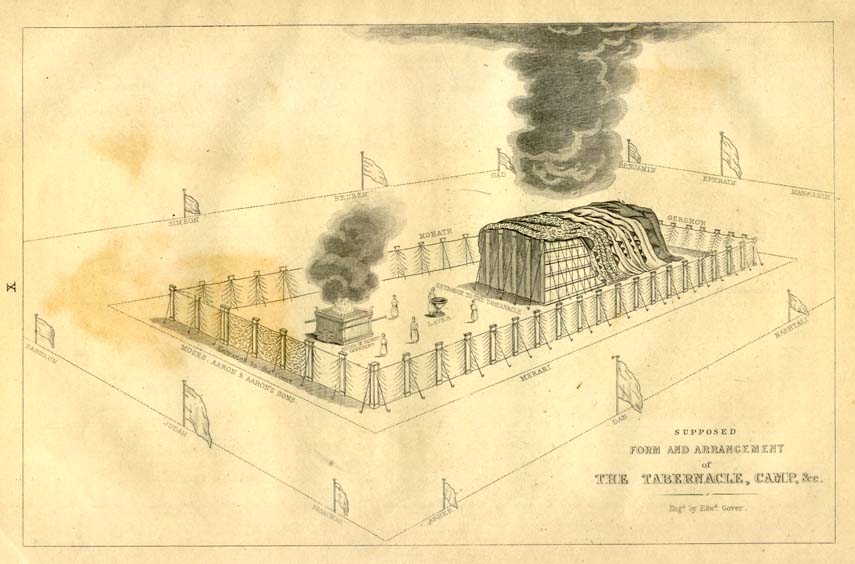

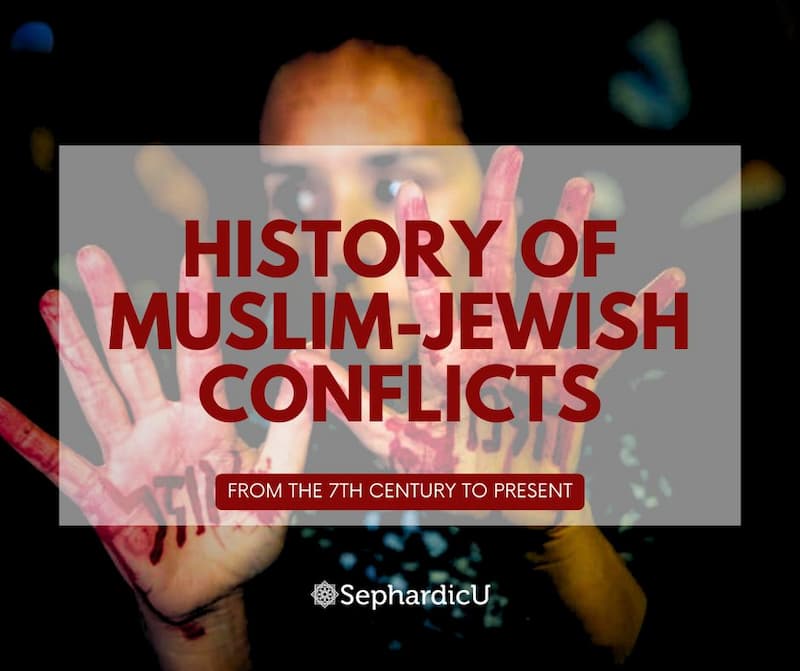
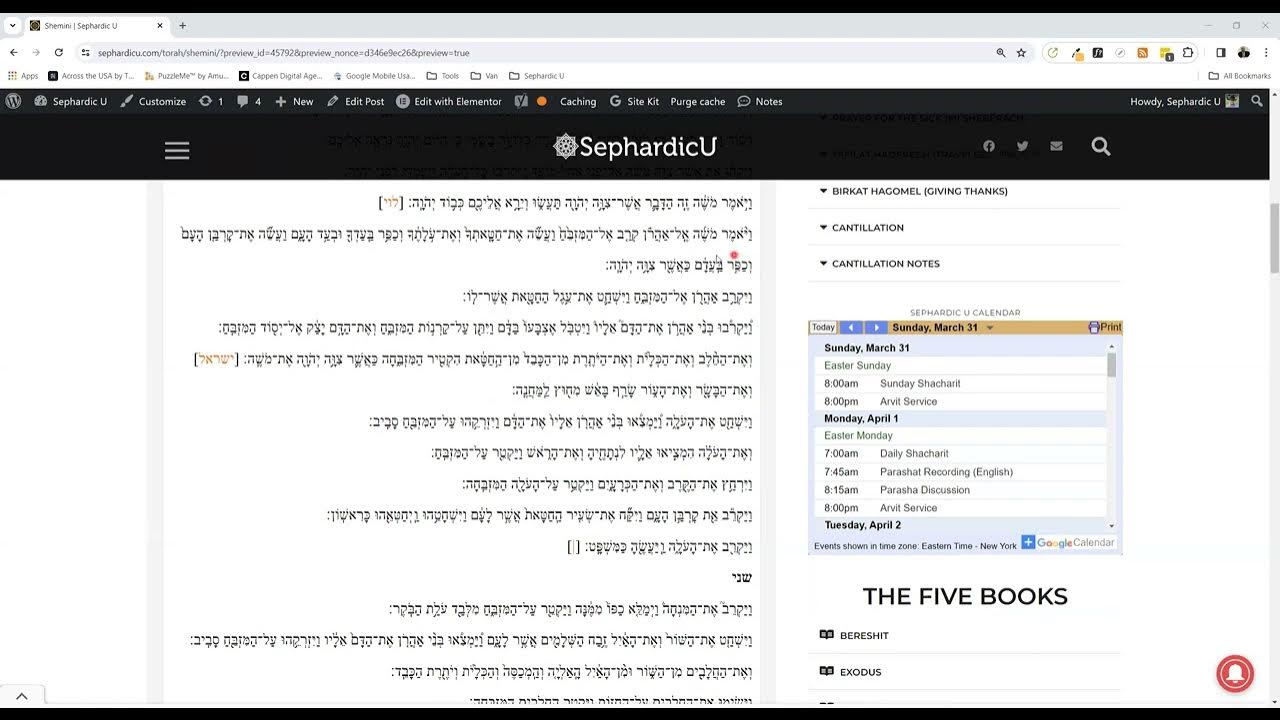
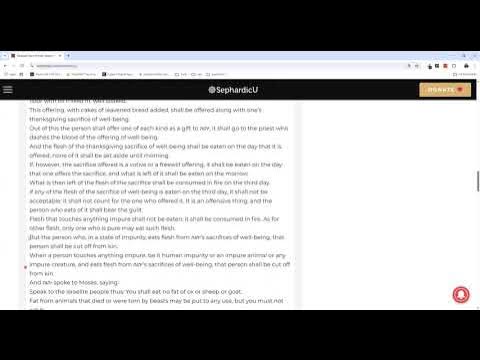
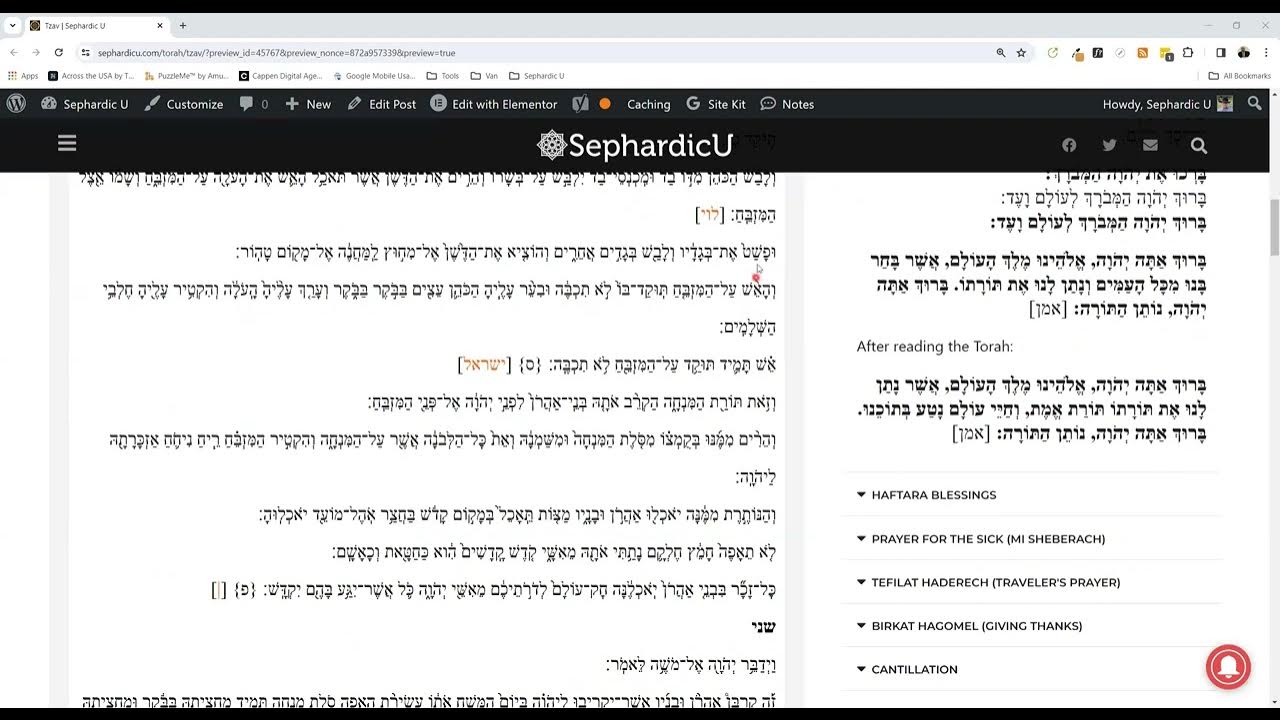
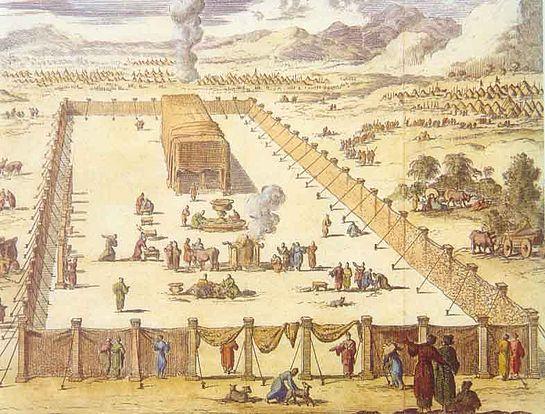



Parashat Naso – English reading